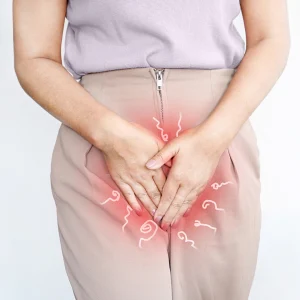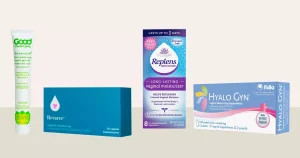
How to treat vaginal dryness. Women of all ages can experience vaginal dryness, a common problem that frequently causes discomfort and affects sexual well-being. People can improve vaginal health, reduce symptoms, and improve their general quality of life by comprehending the underlying causes and putting effective solutions into practice.When necessary, seeking medical counsel guarantees a proper diagnosis and individualized care, fostering the best possible vaginal comfort and health.
HOW TO TREAT VAGINAL DRYNESS
A lack of lubrication and moisture in the vaginal canal is known as vaginal dryness, and it can cause pain during sexual activity, discomfort, and an increased risk of vaginal infections. Even though it’s a widespread problem, controlling symptoms and enhancing general vaginal health require knowledge of the underlying reasons and practical remedies.
Common Causes of Vaginal Dryness:
1. Hormonal Changes:

• Fluctuations in estrogen levels, particularly during menopause, childbirth, breastfeeding, or certain phases of the menstrual cycle, can result in vaginal dryness.
2. Medications:
• Some medications, including certain antidepressants, antihistamines, and hormonal contraceptives, can reduce vaginal lubrication as a side effect.
3. Medical Conditions:

• Certain medical conditions such as Sjögren’s syndrome, autoimmune disorders, diabetes, and cancer treatments can lead to vaginal dryness.
4. Stress and Anxiety:
• Psychological factors like stress, anxiety, or depression can interfere with sexual arousal and vaginal lubrication.
5. Lifestyle Factors:
• Smoking, excessive alcohol consumption, and inadequate hydration can contribute to vaginal dryness by affecting blood flow and overall hydration levels.
6. Chemical Irritants:

• Harsh soaps, douches, perfumes, and certain hygiene products can disrupt the natural pH balance of the vagina, leading to dryness and irritation.
7. Age:
• As women age, the vaginal tissues may become thinner and less elastic, resulting in decreased lubrication and moisture retention.
Effective Solutions for Vaginal Dryness:
1. Water-Based Lubricants:
• Using over-the-counter water-based lubricants during sexual activity can alleviate discomfort and improve lubrication.
2. Moisturizers:

HOW TO TREAT VAGINAL DRYNESS
• Vaginal moisturizers, designed specifically for long-term hydration, can be applied regularly to maintain vaginal moisture levels.
3. Hormone Therapy:
• Hormone replacement therapy (HRT), prescribed by a healthcare professional, can help restore estrogen levels in menopausal women and alleviate vaginal dryness.
4. Vaginal Estrogen Therapy:
• Estrogen creams, tablets, or rings applied directly to the vagina can effectively relieve vaginal dryness in menopausal women without systemic effects.
5. Avoiding Irritants:

HOW TO TREAT VAGINAL DRYNESS
• Avoiding harsh soaps, perfumes, douches, and other chemical irritants can help maintain the natural pH balance of the vagina and prevent dryness.
6. Hydration and Nutrition:
• Drinking an adequate amount of water and consuming foods rich in omega-3 fatty acids and vitamin E can promote overall vaginal health and moisture retention.
7. Stress Management:

HOW TO TREAT VAGINAL DRYNESS
• Engaging in stress-reducing activities such as meditation, yoga, or deep breathing exercises can improve sexual arousal and vaginal lubrication.
8. Regular Sexual Activity:
• Regular sexual activity, including foreplay and arousal, can stimulate natural lubrication production and enhance vaginal moisture.
When to Seek Medical Advice:

HOW TO TREAT VAGINAL DRYNESS
If vaginal dryness persists despite self-care measures or is accompanied by other symptoms such as itching, burning, or unusual discharge, it’s essential to consult a healthcare professional. They can perform a thorough evaluation to identify any underlying medical conditions and recommend appropriate treatment options.
Summary
Dryness in the vagina is a common and uncomfortable symptom. It may be brought on by breastfeeding, some drugs, or a drop in hormone levels. It is frequently associated with menopause. The reason of vaginal dryness usually determines the available treatment choices.